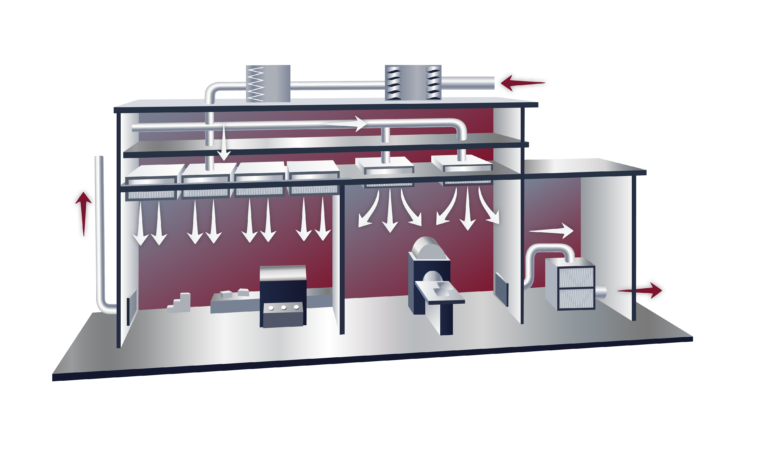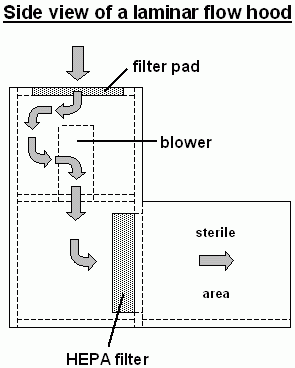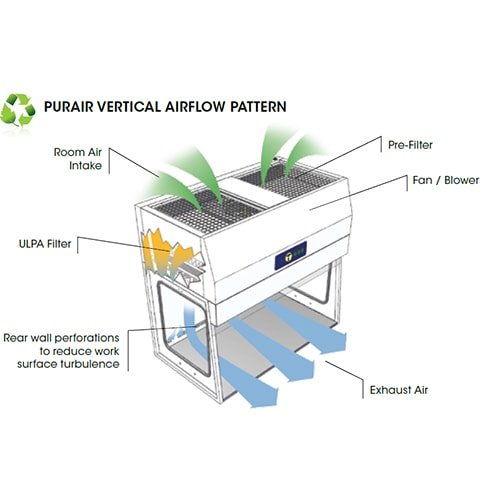When it comes to maintaining a clean and healthy environment in sensitive areas such as hospitals, laboratories, and pharmaceutical facilities, laminar air flow systems play a crucial role. These systems are designed to create a controlled environment by providing a constant flow of ultra-clean air in a unidirectional pattern, effectively minimizing the concentration of airborne particles. At the heart of this system lies the HEPA filter, an essential component that ensures the purity of the air being circulated.

Credit: klimasystem.info.pl
Understanding HEPA Filters
HEPA, which stands for High Efficiency Particulate Air, filters are advanced air filters capable of capturing particles as small as 0.3 microns with an efficiency of 99.97%. These filters are comprised of a dense mat of randomly arranged fibers that trap and retain particles through a combination of diffusion, interception, and inertial impaction. The construction and rigorous testing standards of HEPA filters make them an indispensable tool in maintaining sterile and contaminant-free environments.
Role of HEPA Filters in Laminar Air Flow Systems
In laminar air flow systems, HEPA filters are strategically positioned within the airflow to remove particulate matter and ensure that the air entering the controlled environment is of the highest purity. By efficiently capturing and containing microscopic particles, HEPA filters provide a barrier against contaminants, pathogens, and other potentially harmful agents, thereby safeguarding the integrity of the cleanroom or laboratory space.
Benefits of HEPA Filters in Laminar Air Flow Systems
Integrating HEPA filters into laminar air flow systems yields numerous benefits, including:
- Particle Removal: HEPA filters effectively remove microscopic particles, dust, bacteria, and other contaminants from the air, preventing their circulation within the cleanroom environment.
- Purification of Air: The use of HEPA filters ensures that the air entering the laminar flow system is free from harmful pollutants, promoting a sterile and safe working environment.
- Enhanced Product Quality: By maintaining a clean environment, HEPA filters contribute to the protection and preservation of sensitive products, samples, and equipment from contamination.
- Support for Critical Processes: Laminar air flow systems equipped with HEPA filters provide an ideal setting for critical procedures such as pharmaceutical compounding, research experiments, and medical interventions, where sterile conditions are imperative.
Regulatory Compliance and Standards
HEPA filters used in laminar air flow systems must meet stringent regulatory standards to ensure their effectiveness. Compliance with internationally recognized guidelines, such as those set forth by organizations like the ISO (International Organization for Standardization) and the FDA (Food and Drug Administration), is essential to guarantee the reliability and performance of HEPA filters in critical environments.
Maintenance and Replacement
To sustain the optimal efficiency of laminar air flow systems, regular maintenance and timely replacement of HEPA filters are imperative. Scheduled inspections, filter integrity testing, and adherence to manufacturer recommendations are essential to uphold the quality and functionality of the filters, thus preserving the integrity of the controlled environment.

Credit: www.orchideenvermehrung.at
Frequently Asked Questions On What Is Hepa Filter In Laminar Air Flow?
What Is A Hepa Filter In Laminar Air Flow?
A Hepa Filter in a Laminar Air Flow system is a high-efficiency particulate air filter that effectively removes airborne contaminants, such as dust, pollen, bacteria, and viruses.
How Does A Hepa Filter Work In A Laminar Air Flow System?
A Hepa Filter works by using a dense mesh of fibers to trap and retain microscopic particles, allowing only clean air to pass through. It creates a laminar air stream, ensuring purified air circulation within the controlled environment.
Why Is A Hepa Filter Important In Laminar Air Flow Systems?
A Hepa Filter is crucial in Laminar Air Flow systems as it provides a reliable solution for maintaining a contamination-free environment. It ensures the removal of harmful particles, promoting clean air quality and protecting sensitive equipment and processes.
Where Are Hepa Filters Commonly Used In Laminar Air Flow?
Hepa Filters are commonly used in numerous industries, including healthcare, pharmaceuticals, electronics, and laboratories. They can be found in cleanrooms, operating rooms, biosafety cabinets, and other controlled environments where maintaining clean air is critical.
Conclusion
HEPA filters play a crucial role in upholding the purity and sterility of laminar air flow systems, making them indispensable for maintaining cleanroom environments, laboratories, and other critical facilities. Through their exceptional particle-capturing capabilities and adherence to rigorous standards, HEPA filters contribute to the safeguarding of sensitive processes, materials, and individuals from potential contaminants, ultimately ensuring a controlled and healthy workspace.
Rakib Sarwar is a Registered Pharmacist and a reputed health and wellness blogger. He has a great interest in Air purifiers.
